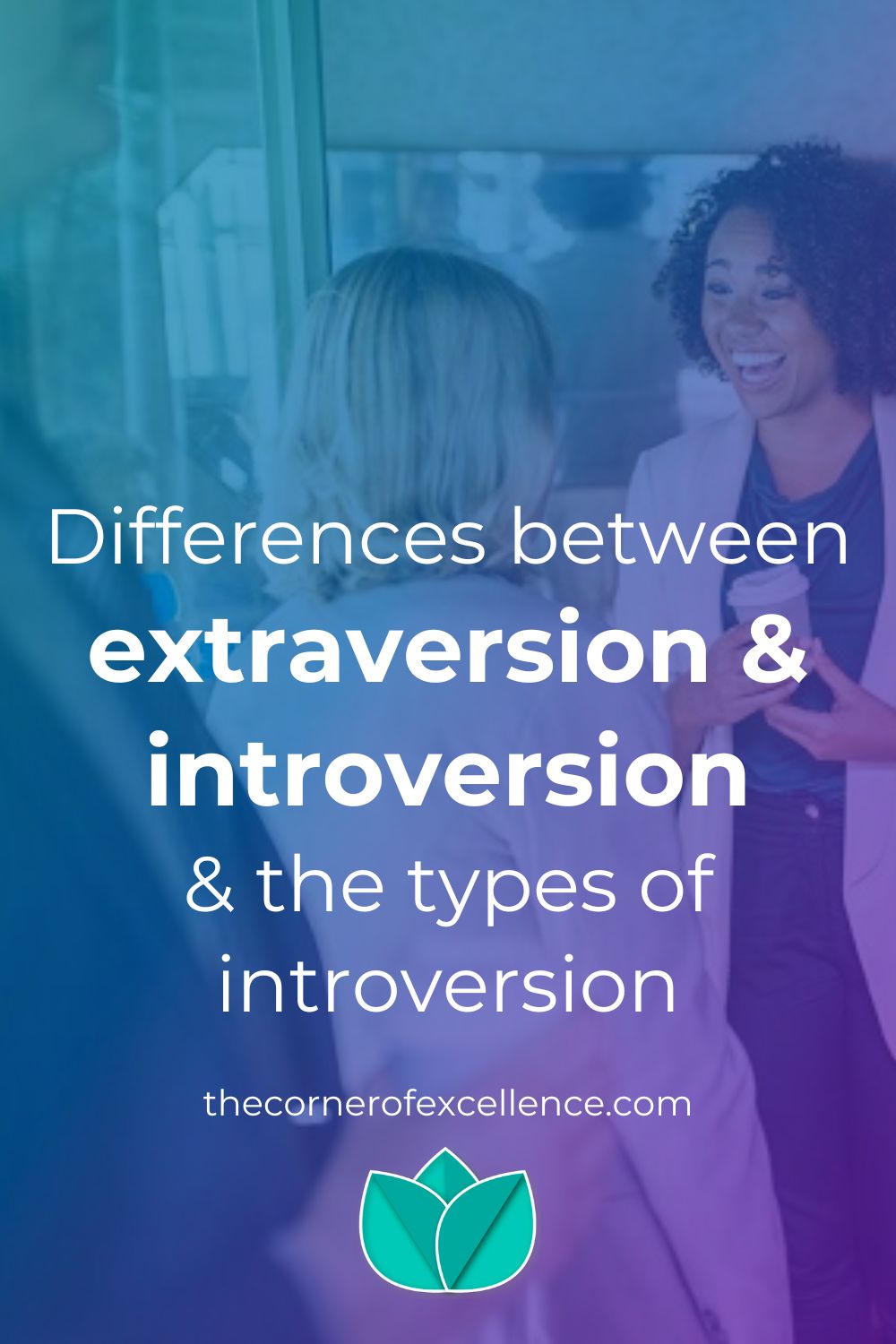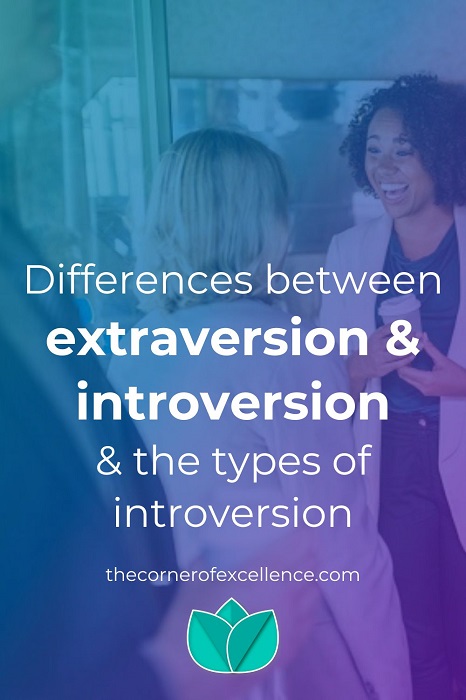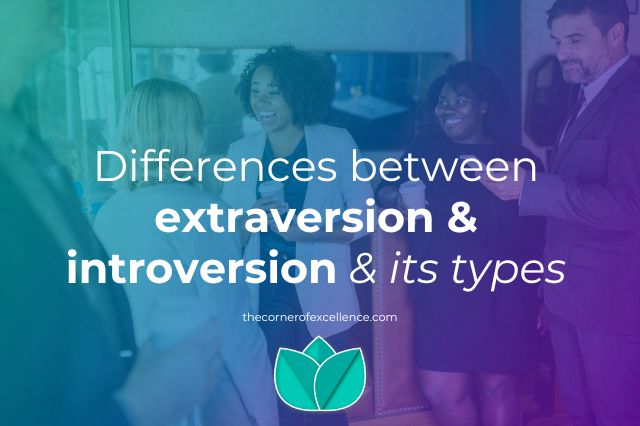
We all know the words extraversion and introversion and we will have labeled people in one way or another. However, the idea that it is better to be extraverted seems to persist. That is partly due to the definition of introversion on personality tests.
Let us see what extraversion and introversion really mean, and their different types.
Differences between Extraversion and Introversion
To begin with, no one is usually one hundred percent extraverted or introverted. We are somewhere between the two extremes.
One of the differences between extraversion and introversion is basically how we process the world around us. An extraverted person is more attracted to external stimuli while an introvert is more entertained by their inner world.
Psychologist Carl Gustav Jung was among the first to coin these terms. According to him, introversion and extraversion are two basic attitudes that influence the four main psychological functions: thinking, feeling, sensing and intuition. Thus, there would be eight personality patterns or psychological types to which a person could belong.
What is Extraversion
Although it is very common to hear or read extroversion or extrovert, what is linguistically correct is extraversion and extravert. This is because the prefix ‘extra’ comes from Latin and means ‘outside’ or ‘extremely’.
Extraverts are often defined as open, sociable, and talkative people. They are people who easily establish relationships with strangers and seem to be the ‘soul of the party’. Extraverts feel comfortable and need interpersonal relationships more than introverted people. They love large events, social gatherings, and team sports.
What is not Introversion?
Starting from the definition of introversion by Carl Gustav Jung, other scientists did their research and developed schemes of personality types. The problem is that many have defined introversion simply as the opposite of extraversion. If the extraverted person is sociable and talkative, the introverted person is quiet and reserved.
They also attributed to extraversion certain personality traits that are not really exclusive to an extraverted person. For example, the Big Five Model defines introversion as low in enthusiasm and assertiveness. According to this model, enthusiasm includes sociability, friendliness, and positive emotions. Assertiveness includes qualities like leadership, getting attention, and taking charge. However the differences between extraversion and introversion are others.
Introversion and insecurity
There are still people who confuse introversion with shyness and lack of self-confidence. However, an introverted person is not necessarily insecure. Similarly, an extraverted person is not always self-confident and may suffer from social anxiety.
What is Introversion
Starting in the 1960s, a number of psychologists began to question how introversion was defined and how that differed from how it was understood by the general public. They realised that many people equated introversion with introspection; that is, the tendency to reflect a lot on oneself.
That is why the personality psychologist Jonathan M. Cheek and other colleagues decided to study introversion under another approach, free from forcing it into other schemes.
Introversion is basically the tendency to look inward rather than outward. These are people with a rich inner life. Introverts usually get tired of social events. Also, they restore their energy and relieve stress better with solo activities.
Types of Introversion
Building on this new approach to the study of introversion, Jonathan Cheek developed the STAR model with four subtypes of introversion: social, thinking, anxious, and restrained. You can be a combination of several of the types but you will have a predominant one.
Let us see what characterises these archetypes.
Social Introvert
The first subtype is perhaps what most of us understand by introversion. The social introvert prefers solitude. They love to spend time alone dedicated to their hobbies. They do not mind doing activities, such as going to exhibitions, going for walks or even travel alone.
When it comes to socialising, people with this type of introversion prefer small groups to large gatherings. But in the latter type of event they are the rock in a rough sea.
Thinking Introvert
As the name says, people in this subgroup are thinkers. They like to read, study or investigate. They also love to create, have ideas, create hypotheses and tell stories.
The thinking introvert has such a rich internal world that they may appear distant and sluggish. They are able to lose themselves in an internal world of fantasy, but in a creative and imaginative, not neurotic way, according to Jonathan Cheek. They are self-reflective and more introspective than the average introvert. That is why they take their time to think about the answer to a question.
Anxious Introvert
Anxious introverts are often quiet and seem nervous. They can even seem rude at times. But this is a self-defense mechanism.
It is because they feel uncomfortable and self-conscious around other people. They are not confident in their social skills. That is why they tend to seek solitude and avoid social gatherings.
However, the anxiety does not go away when they are alone either. The anxious introvert has a tendency to ruminate and dwell on what could happen or has gone wrong. That is why it is hard for them to get out of their comfort zone.
Restrained Introvert
People belonging to this fourth subtype are usually on guard and very reserved. They do not open until they take some confidence. However, they do not usually seem distant or shy but rather thoughtful and sensible. Reserved introverts are often quiet, determined, and dependable people who are trusted by others.
Reserved introverts prefer to think before they speak or act. That is why they may seem a bit slow, but because they go at a methodical pace. They tend to add common sense to discussions and activities. In social gatherings, their moderation also tends to balance the impetuous nature of highly extroverted people.
Extraversion and introversion in summary
There was a time when it might seem like you had to aspire to be an extravert because being an introvert had negative connotations. But neither extraversion nor introversion is bad or good. They are ways of facing the world and perceiving our surroundings. Amongst the differences between extraversion and introversion, there is a greater interest in external stimuli or rather in one’s inner world.
Knowing whether you are more of an extrovert or an introvert, and what type of introvert, helps you understand why you react to situations in a certain way. These are factors to take into account to take care of your well-being. That is because it helps you understand why certain situations stress you. Also which activities are good for you to relieve stress and take care of your well-being.
Extraversion and introversion: which side are you on?
Are you more of an extrovert? Or are you an introvert? Did you know the types of introversion? If you are an introvert, which one do you identify with?

Photo by rawpixel.com from PxHere
Sharing is caring!






2 Responses
I absolutely loved this and kinda had an idea, but this is so informative. And I’m so looking forward to reading how these quality differences influence your stress different. Great article.
Thank you! Really glad you liked the article and I hope you find it helpful.